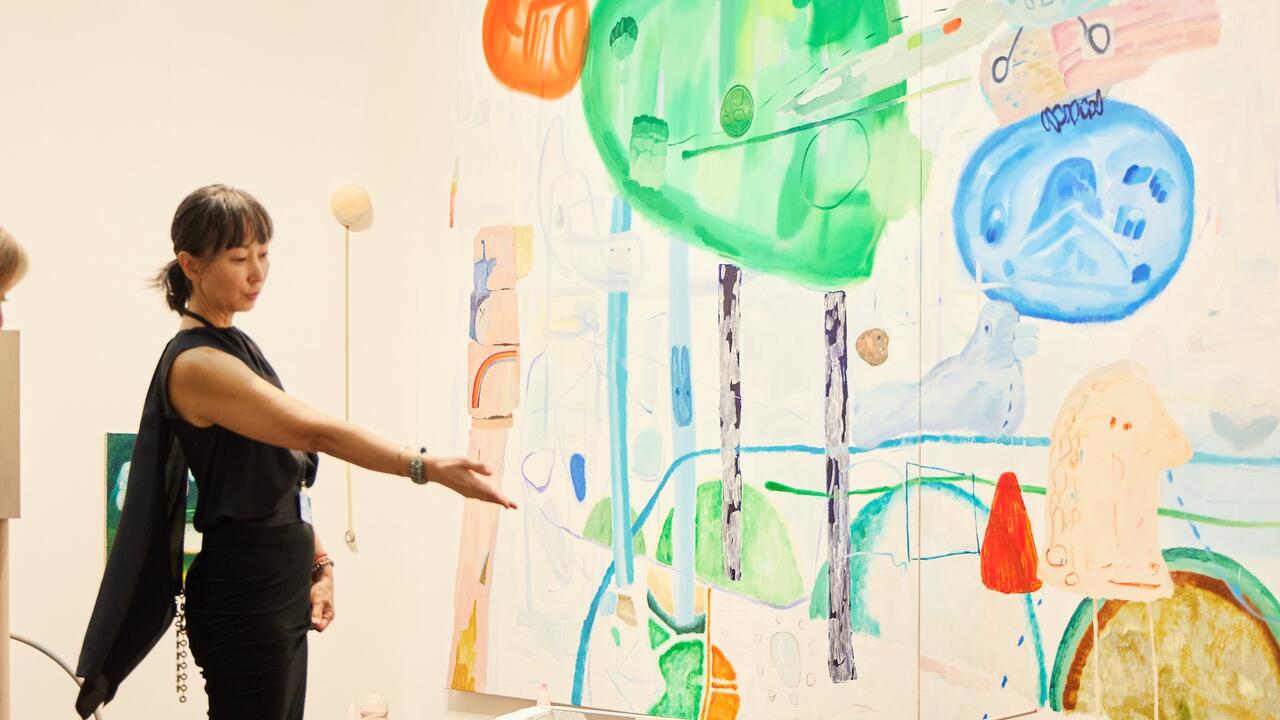Vincent Fecteau
These funny objects, things of some sadness, are private. Private as opposed to (wilfully) obscure. Unpretentious and elusive, their privacy is as crucial as their humour, although I cannot come up with any reasons why the longer I keep looking at them the more I laugh. Sadness, a ghost, moves around them like air, and some of the laughter (but only some of it) may have been to keep from crying. Funny? Get a load of these colours: oak, pine, beige, grey, greige, taupe, ivory, teak, white, off-white, black and various gradations between all of these and then dreamy reprieves of sky blue, ochre, magenta and lime. Funny, because someone else some somewhat anonymous industrious being, or group of beings, in a busy office with a desk in a cubicle, in a firm made up of such busy cubicles, stacked in floors in a building designed the things appearing in the interior design magazines out of which Vincent Fecteau has constructed his assemblages, collages and groovy little objets. Curved partition 'walls'; corridors decorated with Vasarely and Albers-like grids of colour leading nowhere; stereophonic equipment and acoustic-dampening ceiling tiles; show rooms and living rooms; furnishings; groups of vacated chairs in a debased Pollock paint-spattered room; television, television consoles and cabinetry, and little consolation efficient for something, filled with specific-yet-typical supplies, the venues may be called blank. There is a vocabulary for this world of flex spaces and interiors, aligned to the world of business but different from it, aligned to masculinity and maybe not so different from it, and it escapes me. Anyway, Fecteau simulates, often in 3-D, not these vacant domains but something more tenuous and odd: their chill, available room tone; beauty.
He manages to incorporate all the strangeness of this found material by keeping close to what it already is benignly abstract, apersonal, weird. All these things almost in spite of itself, since it has been designed to represent the veneers of proficiency (places where work gets done); situate the bodies which do the work; and maintain all that is supposedly, resolutely not weird (the corporate world). In all his work, he explores the almost erotic tension between actual space and the flat depths of rendered space. Through a disorientating attention to detail and surface, by juxtaposition and a quiet compositional complexity, Fecteau delivers not a denouement of overlooked interior design ephemera but the pleasures of banality transmitted into things which provide a place for doubt, his as much as anyone's doubt being the surest sign that something is new, tender and quick, i.e. alive. Doubts about what's going on.
In the midst of some of his pieces, seagulls, little marker Ws on their sides, fly around Zenith televisions, down corridors, taking fight Jonathan Livingston Seagull worn down to a forlorn doodle. I shall refrain from speaking of mortality and just say that one of his small accumulations includes a plastic ice cube and tiny tombstones with incoherent scrawled epitaphs, and that not a single body appears anywhere yet the various planes of his spacey miniature environments resonate with bodies and their absence. Tucked into small corners, his Hockney-blue swimming pools are empty.
Here are some words: foamcore, laminate, plastic.
Here are some concepts: bachelorhood, Scandinavian design, departure.
Here is the mood: the displaced eroticism of American Gigolo, the ominous unspecifiability of Safe.
And here I could tell you that Fecteau's work keeps reminding me of certain songs by Stereolab. I could tell you I get the same rush from his close examinations avoiding closure that I do from Keanu Reeves, Peggy Lee's gone voice, the dislocations of Joan Didion's prose and from a few boys at the gym who stare and stare in the mirrors at what they are becoming which is not something they, or I, fully understand and has nothing to do with vanity but with sweetness and getting the goods on being. Failing. Trying again.
Nothing connects this.
Contemplating the fucked-up ways in which meanings cohere (barely) around things frequently deemed meaningless or inscrutable. Just a minute. That's not quite right. Contemplating the fucked-up ways in which meanings elude words and yet often fix on whatever stuff is least expected, Fecteau cruises a territory where the sublime and the ludicrous, passion and indifference, depression and levity keep eclipsing one another, or the possibility or need for such distinctions fades away. His work is as much about finding out what he can do as the objects are examples of why that perhaps cannot be done, only attempted again. Precise and subtle, the project is only as ambiguous as life.
















